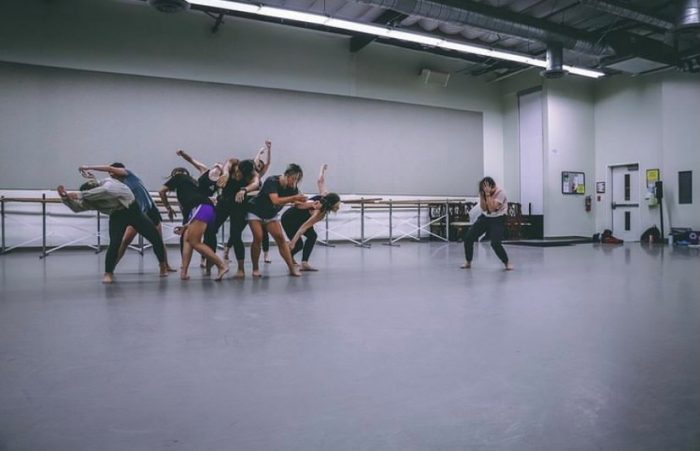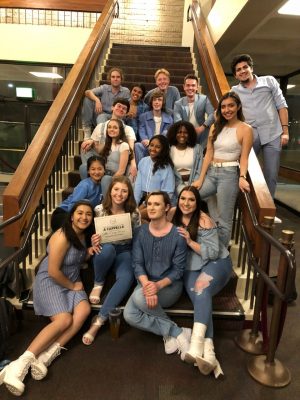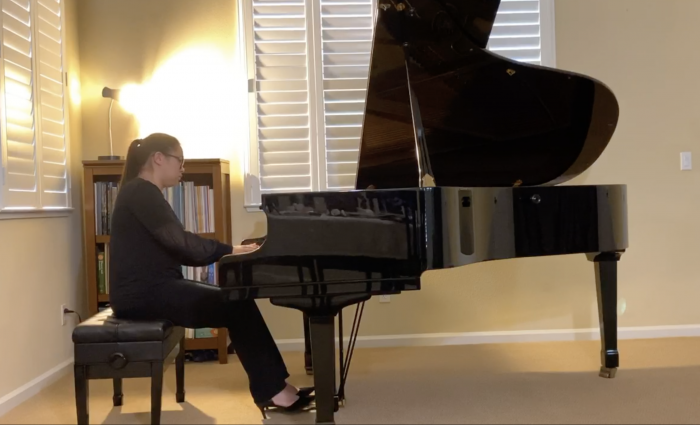
With isolation in place, students will be practicing on their own.
You think the pandemic is hard on most classes. Think about the poor dancers. You can’t always Zoom your way across the stage while learning.
The students of the performing arts department at Chapman University have been removed from the stage due to COVID-19 and are now learning to act, sing, dance, and play instruments — all online. Most Chapman classes have managed to make that Zoom transition without too much trouble.
Performing arts, however, is another story.
Online means performing arts have had to change their approach and the rest of campus is feeling their absence. Performing arts play a valuable role in student culture on campus. Chapman boasts more than ten performing arts clubs on campus, from Broadway to tap dancing.
It certainly hasn’t been smooth sailing for theater majors.
Samantha Borthwick, a sophomore theater performance major with a minor in musical theater, summed up her performing arts experience on Zoom this way:
“Chaos, it’s been chaos.”
Theater performance majors have been relying on recording their monologues and scenes. The only chance they have for live performance are readings of scripts and monologues over Zoom.
“I am training for live performance, not screen acting,” said Borthwick.

In addition, Borthwick emphasised that the technical aspect of theater has been almost completely erased. Even classes like stage combat and intimacy training have been cancelled due to the necessity of physically being on set.
“The community aspect is gone. We cannot act in masks,” said Borthwick.
Borthwick emphasised that seeing the emotion play out on others actors faces is key to live theater, and in that case it is just better to be online so you can at least see other people’s performances. There has been, however, a unique opportunity for theater majors and minors. Similar to the NBA Orlando Bubble, those who have auditioned and been accepted for the mainstage theater production in February can quarantine together.
Borthwick doubts the audience will be live, but has agreed to the terms of the theater bubble, which includes being tested almost daily and only interacting with fellow actors. She just wants to keep some semblance of her education intact.
Most performing arts majors have to apply to one of these sectors: the Department of Dance, Hall-Musco Conservatory of Music, Department of Theater, and Dodge College of Film and Media Arts. These departments require students to go through a rigorous application process, involving an audition, portfolio, and creative supplement. On average, students aiming for performing arts programs have a roughly 30 percent acceptance rate.

Dance majors aren’t faring any better.
“Being in a virtual setting has made it hard to find that fulfillment I am so used to experiencing in my dance classes,” said Lauren Bramlett, a sophomore dance major.
She didn’t expect to trade her dance studio for a screen. Of course no one expected the ways COVID would affect their education. For dance majors, the switch to online classes pulled the rug out from under them. Bramlett is also an executive board member of the Chapman Dance Alliance. Normally, dance majors take three technique classes and an elective. During the spring, there are three shows choreographed by sophomores, juniors, and seniors.
“It’s usually a lot of rehearsals which we don’t have at all anymore,” said Bramlett.
The class schedule has stayed the same while on Zoom. Bramlett is currently able to safely practice at a studio in Dallas. However, many dance studios are closed or operating at limited capacity so students are adjusting to the limited space and lack of mirrors.
“It’s definitely hard. I’m lucky I can practice some in my home studio,” she said.
When classes were partially in-person, the professor would be in the studio teaching half of the students in class while the other half were on Zoom. To make things even more difficult, sometimes the professor would simultaneously be teaching on Zoom, so only a select few students were actually in the studio. The faculty show that normally occurs in the fall has now switched to using video submissions.
Classes are harder because of the lack of clear audio and music on Zoom. Due to sound delays, the students aren’t practicing in sync with each other. That being said, Bramlett found her classes to be pretty active.
“The dance department has done a great job of adapting… it’s hard but they’re doing a good job,” she said.
According to Bramlett, the Chapman Dance Alliance is still doing weekend dance practices via Zoom. The switch to camera-based learning has brought some good with it as well.
“We’re learning to dance for the camera so that’s a surprising positive,” said Bramlett.
A downside has been the inability to welcome new freshmen. Usually, it’s a major priority for the dance alliance and freshmen are paired with upperclassmen. However, Bramlett is still able to interact with her freshman partner through FaceTime.
“That aspect of my freshman year was so important to me,” she said.
The dance department is still planning on doing the spring shows planned by upperclassmen. They also hope to film rehearsals and have a video showcase, rather than a live one.

For clubs like the Chaptones, one of Chapman’s a cappella groups, the lack of in-person interaction has been a detriment.
According to the Chaptones president and junior sociology major Marjan Moshiri said, the club hasn’t held any performances or competitions. Chaptones also hasn’t been able to hold virtual rehearsals due to the sound lag on Zoom and FaceTime.
Normally, the club has two rehearsals a week and attends UCLA a cappella festivals. Chaptones also competed in the International Championship of Collegiate A Cappella (ICCA) and made it to semi-finals last year.
Currently, the club holds Zoom meetings to stay connected. The club also holds Zoom meetings with other campus singing clubs and people interested in auditioning. The eight members are able to do some socially distanced meetings as well. While the group may not be very active currently, it is still very connected.
Marjan said, “We try to stay as connected as possible but we’re trying to be really safe as well.”
Many students in musical performance are concerned for where their futures are headed. One of these students, Erica Phung, a senior music performance major with an emphasis in piano and conducting, is graduating at the end of the Fall 2020 semester.
“If it weren’t for COVID-19, I would have had my conducting senior recital in October,” said Phung.
Instrument sections like the strings and percussion can be played with a mask in a social distanced area. According to Phung, The brass, woodwinds, and any vocal performance is not possible in any current, social situation due these instruments being “superspreaders”.
Phung, however, is determined to not let COVID-19 keep her spirits and motivations down, and believes that she can use this opportunity for the better.
“Being able to have my time and my own headspace taught me a lot about listening to my own thoughts and growing artistically that I never had at school,” said Phung, “There was so much noise all the time.”
Phung began to alter her plans after she realized that the effects of this pandemic were going to be long-term. She decided to make a mindset change and make the most of the opportunity she had at home.

Phung will be attending a two-year program at Longy School of Music in Cambridge, Massachusetts in January 2021. Her original plan was to pursue a career in conducting, however, due to COVID-19, that is not a possibility right now. She decided to return to her roots and pursue a socially distanced instrument: piano.
“I knew that the route with conducting that I had originally planned wasn’t going to work out. So I re-steered myself and am now getting a masters in performance piano this spring,” said Phung.
